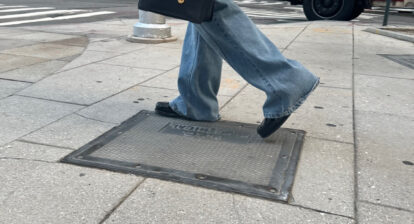
It started with a sound no one could ignore.
A rusted faucet turned on in a family kitchen in Jackson, Mississippi, and what came out wasn’t water—it was a warning. Murky, discolored, sometimes absent altogether. In Flint, Michigan, the same story poured out years earlier, thick with lead and betrayal. For Black residents in both cities, the crisis didn’t arrive with the theatrics of a highly anticipated sci-fi series.. It came slowly, daily, with each cup drawn, each child bathed, each meal cooked in poison. The emergency wasn’t only in the contamination—it was the silence that followed.
These weren’t isolated malfunctions. They were systemic choices—crises rooted in neglect, cemented by racism and delivered with the cold precision of indifference. No volcano erupted. No global emergency was declared. But for the people who lived through those dry faucets and bottled water rations, it might as well have been the end of the world.
And that’s precisely where Hulu’s Paradise picks up.
In the Hulu original series, the world ends from the impact of volcanic fire and the terror of nuclear fear. But the real danger doesn’t come from Mother Nature—it comes from the people with power. A handful of handpicked elites are shuffled into an underground bunker—state-of-the-art, climate-controlled, and morally bankrupt. The rest of humanity? Left to fend for themselves. The bunker’s creator, Sam, a tech billionaire with God-complex tendencies, doesn’t just build a safe haven. She builds a caste system. She builds a lie.
Yes, Paradise is science fiction. But let’s be honest—it’s also a little too familiar. Because this show isn’t just asking whether the world will end. It’s asking the fundamental question: When the world does fall apart, who gets chosen to live? And who gets ghosted by the system—again?
And that is a story Black America knows intimately.
From the floods of Katrina to the poisoned pipes of Flint, from the heat islands of the South Side to the asthma corridors of the Bronx, climate change has never been race-neutral. The idea of climate justice as a universal human issue—something that affects us all equally—erases the reality that race determines the air you breathe, the water you drink, and the likelihood that your home will survive the next hurricane.
According to the United Nations Development Programme, structural inequalities based on race, ethnicity, gender and socioeconomic status make marginalized communities disproportionately vulnerable to climate impacts—despite having contributed the least to the crisis. In the U.S., African Americans are more likely to live near polluting industries, lack access to central air in extreme heat, and suffer higher rates of respiratory illness linked to environmental exposure.
This isn’t collateral damage. It’s the architecture of environmental racism.
And Paradise dares to dramatize it.
The bunker is a marvel of modern design, but it functions like a privatized utopia—governed not by democracy but by a handful of elites. The selection process is cloaked in moral language—essential personnel, best and brightest—but underneath, it echoes the same logic that built segregated neighborhoods, gated communities, and redlined maps. Everyone inside has been deemed worthy. Everyone outside has been deemed disposable.
Xavier Collins, played masterfully by Sterling K. Brown, starts pulling at the seams of that fantasy. He’s a Secret Service agent who slowly uncovers that the outside world is not, in fact, uninhabitable. Survivors remain. Among them, possibly, is his wife—left behind not by fate, but by a decision—a decision to exclude.
That’s when Paradise stops being television and starts becoming testimony.
Jackson, Mississippi, serves as one of many real-world parallels. A Fordham University Law Review notes that in 2022, over 150,000 residents—more than 80% of them Black—lost access to safe drinking water following decades of infrastructural neglect. It wasn’t a surprise; it was inevitable. The EPA had flagged Jackson’s water systems for years. The city had faced repeated boil-water notices. But when the flood came, the system collapsed. The taps ran dry while nearby, in whiter, wealthier communities, people carried on unbothered.
The response wasn’t just inadequate—it was deliberate indifference.
Likewise, in Flint, government officials knowingly exposed residents to lead-contaminated water after switching the city’s supply. The courts later ruled that the state had shown “deliberate indifference” to the bodily integrity of its citizens. In both Jackson and Flint, residents were not merely neglected—they were targeted by policy decisions that favored cost-cutting and control over care and accountability.
That’s the genius of Paradise. It dramatizes what we’ve already lived through. The plot might be fiction, but the policy implications are real. The state doesn’t always fail during a crisis—it often functions exactly how it was built: to preserve power, maintain order, and protect the privileged.
Robin D.G. Kelley once said, “Freedom dreams are born of fascist nightmares—or better yet, born against fascist nightmares.” Paradise is one of those nightmares dressed in a clean jumpsuit. It’s the liberal apocalypse fantasy: order over equity, secrecy over solidarity, and a false peace paid for with everyone else’s silence. Sam, the architect of the bunker, isn’t trying to save the world—she’s trying to save her version of it.
And yet, like all systems built on lies, it starts to crack.
When Xavier broadcasts the truth—that they’ve been lied to, that people are still alive outside, that Paradise is built on half-truths and silenced dissent—he becomes the avatar of witnessing as resistance.
That moment? That’s the praxis. That’s the organizing. That’s the tradition.
From the sanitation workers in Memphis to the frontline fighters at Standing Rock, Black and Indigenous communities have always been the canaries in the climate coal mine. We’ve been ringing the alarm. We just get dismissed until the fire hits everybody else’s backyard.
What Paradise ultimately forces us to confront is this: Climate change won’t create new inequalities—it’ll deepen the ones we already refuse to deal with. And unless we get serious about racial equity—about who gets clean air, who gets to evacuate, who gets infrastructure, who gets heard—then the next apocalypse won’t need a volcano. Just the same politicians, the same private interests and the same policies that have already proven they’re okay with letting specific communities fall by the wayside.
So when the floods come or the grid goes down, it won’t be the Earth that failed us.
It’ll be the people who had the chance to tell the truth—and didn’t.



